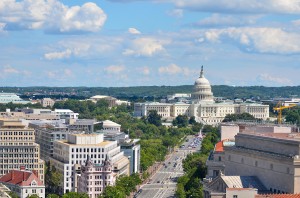 WASHINGTON – Washington, D.C.-based think tank The Jamestown Foundation brought together more than 100 experts and diplomats in late October to review the challenges faced by Central Asia, U.S. strategic interests in the region, the prospects of the New Silk Road, the role of international actors and the need for continuing U.S. engagement in the region.
WASHINGTON – Washington, D.C.-based think tank The Jamestown Foundation brought together more than 100 experts and diplomats in late October to review the challenges faced by Central Asia, U.S. strategic interests in the region, the prospects of the New Silk Road, the role of international actors and the need for continuing U.S. engagement in the region.
The conference was titled “U.S. Relations with Central Asia after 2014 and the New Silk Road: Regional Integration, Trade and Economic Prospects.” It included keynote addresses by Kazakhstan Ambassador to the U.S. Kairat Umarov and U.S. Deputy Assistant Secretary of State for South and Central Asian Affairs Lynne M. Tracy. Frederick Starr, chairman of the Central Asia-Caucasus Institute at Johns Hopkins University, gave the opening remarks.
Umarov said the government of Kazakhstan “has embraced the New Silk Road vision from the very beginning,” because it believes that “regional integration, trade and economic relationships in the region are the main foundations on which stability, peace and economic reconstruction will be built.”
Kazakhstan has already invested significant resources in boosting regional connectivity. Rather than raising anxiety about the increased potential for instability and extremism beyond 2014, Kazakhstan is proactively adjusting its economic diplomacy to create strong partnerships with businesses and provide more opportunities for regional cooperation.
According to the ambassador, over the course of the past 10 years Kazakhstan has provided Afghanistan with more than US$14 million in food aid and more than US$2.3 million to fund infrastructure projects in the country. More recently, Kazakhstan has pledged US$2 million to sustain the Afghan National Security Forces, and it has also extended until 2018 its US$50 million programme to educate 1,000 Afghan students at Kazakhstan’s leading universities.
“Playing an active role in advancing the Istanbul ‘Heart of Asia’ Process, we hosted its third ministerial meeting in April,” Umarov said. As one of the leading countries in the Istanbul Process’ Confidence-Building Measures in Disaster Management, Kazakhstan plans to set up a new Emergency and Disaster Risk Management Centre in Almaty.
Starr, author of the defining 2009 report outlining the New Silk Road strategy for the region, set the general tone for the event, lamenting a policy vacuum with regard to the New Silk Road and the absence of a financial commitment from the U.S. government.
In her speech, however, Tracy stressed the potential to turn Central Asia into “an economically vibrant, interconnected region,” which is why “the U.S. government is working so hard with our partners in the region to translate the New Silk Road vision into concrete results.”
While the speakers at the event suggested the emergence of yet another round of the Great Game in Central Asia, the American diplomat noted that the U.S. welcomes “the efforts of China to develop energy and transportation infrastructure in the region” and those of Russia, which it sees as “mutually reinforcing and beneficial to the Central Asia countries and Afghanistan.”
Tracy also said the U.S. is quite realistic in its assessment that even though its companies “are major players in Central Asia, particularly in the energy sector,” it is neighbouring China that “is naturally going to be a leader there in trade and investment.”
The one-day conference took place two years after former Secretary of State Hillary Clinton’s announcement of the U.S.’s New Silk Road vision for Central Asia and Afghanistan, which aimed to integrate the region and boost its potential as a transit area between Europe and East Asia.
Other speakers included Lieutenant Colonel Robert Schaefer of the U.S. Army Special Forces and chief of the Central and South Asia branch of Army Central Command; Jamestown Senior Fellow Vladimir Socor; David Sedney, former deputy assistant secretary of defence for Afghanistan, Pakistan, and Central Asia; Stephen Blank, senior fellow at the American Foreign Policy Council, and others.
Founded in 1984, The Jamestown Foundation is a leading think tank, the stated mission of which is to inform and educate policy makers about events and trends that it regards as being of current strategic importance to the United States.
